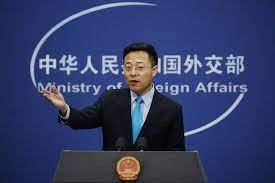On May 8, China’s Foreign Minister, Qin Gang, delivered a strong message to the U.S. Ambassador, placing the responsibility for the current downturn in relations between the two countries squarely on Washington’s shoulders. According to an official, Qin Gang emphasized that before ties between China and the United States can return to a healthy track, the U.S. must engage in deep reflection.
The relationship between the world’s two largest economies has been strained in recent times, leading to a suspension of serious dialogue on various issues. One of the key sources of contention has been the escalating trade dispute, with tariffs being imposed by both sides. The tit-for-tat measures have had a negative impact on the economic interests of both nations, as well as global markets. These trade tensions have created an atmosphere of uncertainty and hindered economic cooperation.
Another bone of contention is the U.S. government’s attempts to restrict China’s access to cutting-edge technology. The U.S. has implemented measures aimed at limiting Chinese companies’ involvement in sensitive industries, citing concerns over intellectual property theft and national security. These actions have further strained relations between the two nations and have contributed to an overall sense of distrust.
Additionally, China’s claims to self-governing Taiwan and vast areas of the South and East China Seas have been a persistent source of disagreement. The U.S. has been critical of China’s assertive actions in these regions, expressing support for Taiwan and conducting freedom of navigation operations in the disputed waters. China, on the other hand, sees these actions as a violation of its sovereignty and an interference in its internal affairs.
Qin Gang’s statement reflects China’s frustration with the current state of affairs. By calling on the U.S. to reflect deeply, he is highlighting the need for a comprehensive reassessment of the issues that have led to the deterioration of relations. This implies that China perceives the U.S. as the primary driver behind the strained ties and expects Washington to acknowledge its role in the current situation.
The comments from China’s Foreign Minister indicate that the country is seeking a more constructive approach to resolving the issues at hand. However, they also serve as a reminder that any progress in bilateral relations will require a willingness from both sides to engage in meaningful dialogue and find common ground.
It is crucial for both China and the United States to recognize the significance of their relationship, not just for their own economies but also for the stability and prosperity of the global order. The challenges they face are complex and multifaceted, requiring a nuanced and strategic approach. Both nations have much to gain from cooperation and finding mutually beneficial solutions to their differences.
The road to repairing and strengthening China-U.S. relations will undoubtedly be challenging, but it is not an insurmountable task. It will require a willingness to engage in open and honest dialogue, to address grievances, and to explore areas of potential cooperation. A renewed commitment to constructive engagement and a shared vision for the future can pave the way for a healthier and more stable relationship between these two global powers.


